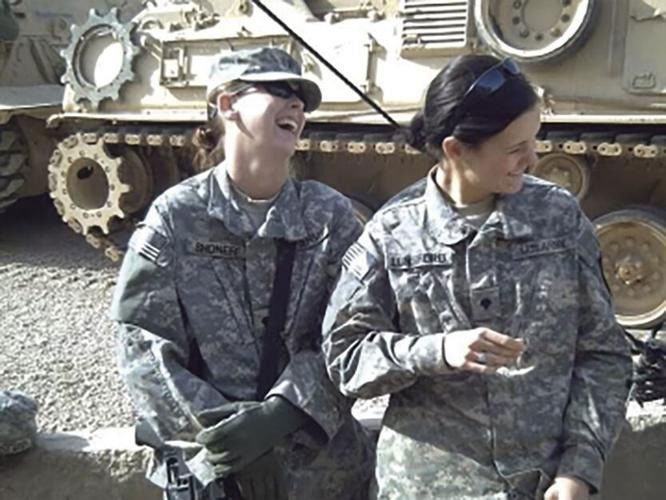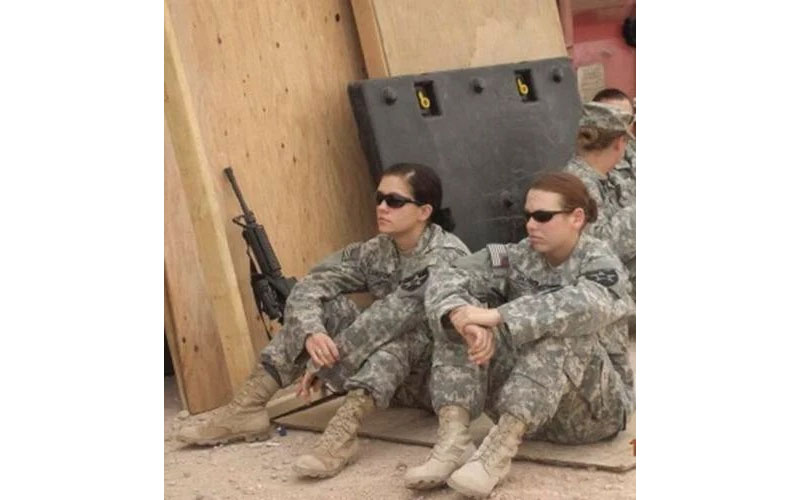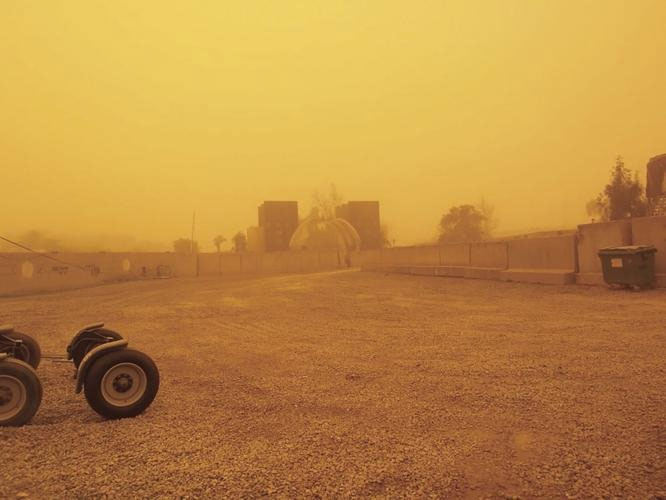
Monica Reyes, left, and Angela Lunsford in Iraq. Courtesy photograph
Sisters in arms: Two friends from Acampo go to war, together
By Steve Mann/Special to the News-Sentinel
November 10, 2023
Two friends. They called them “The Sisters.”
They even share the same birthday, same day, same year. They’re exactly the same age, 37.
Monica Hope-Reyes was born in Lodi, but Angela Lunsford was born in L.A. They met in the 3rd grade at Oak View Union Elementary in Acampo, says Angela, and they’ve been close friends ever since. They both graduated from Galt High School.
By 2005 the war in Iraq was in full swing. Lured by an opportunity to serve their country, and a $10,000 signing bonus, the two 18-year-olds enlisted in the United States Army. The pair went through basic training and Advanced Individual Training at Fort Leonard Wood, located in the Missouri Ozarks. Monica says she “joined on a whim,” but also wanted to challenge herself, wondering if she could pass basic training. “I’m going to show up and do my best,” she says. She had always been athletic, she says, but concedes basic training was hard. Both of them turned 19 while in basic, 20 while in Iraq.
She recalls one of the worst things about the training wasn’t all the yelling from drill instructors, or even the physical demands. It was the cold. She says her feet were so cold that she even contemplated quitting. But a friend told her to “buck it up.” She did.
After graduating from training camp where they learned to become soldiers, their first duty station was at Fort Carson, Colorado. From there, it was on to southeast Baghdad, Iraq.
They were assigned to the forward operating base (FOB) Rustamiyah, a fenced-off compound that housed about 500 soldiers and included barracks, a mess hall, and various stores operated by Iraqi citizens. There were also communication centers where troops could call home, and Internet cafes run by Iraqi businesses. Monica says the barracks once housed Saddam Hussein’s troops. Monica remembers the place being hot and dusty. It would be their home-away-from-home for at least a year.
The two friends were in Iraq during the first troop surge. Both Monica and Angela chose to serve in transportation and logistics. They drove any number of different military vehicles, from Humvees to 18-wheelers. They mainly transported supplies and people. However, Angela says they also did night missions, driving fuel tankers to various outposts. Monica says one of the reasons there was a $10,000 signing bonus for drivers was because so many of them were killed in action.
“That wasn’t a huge deterrent for me,” she says. “I did not fear it.” Both ladies say their deployment was scary, but being there with a friend was a huge blessing, says Monica. “The Lord got me through it,” she says.

Angela Lunsford, left, and Monica Reyes take a break at forward operating base in Rustamiyah, Iraq. Courtesy photograph
While neither of them were shot at or encountered an improvised explosive device (IED) while driving in Iraq, they say they were under constant mortar attack by the enemy. Both said the base was attacked about five times a day. Fortunately, neither of them was injured in any of the assaults.
Everyone was required pull a shift as an entry control point guard, searching and checking people in as they entered the base. Every day Iraqi civilians would enter the compound to work in stores at the base. Each had to be searched for weapons and explosives. Only female soldiers could search female Iraqis. The FOB was also home to the Iraqi army, who quartered next to the Americans. The base was divided by a fence, and there was an entry control point gate that allowed Iraqi soldiers to enter the American side of the encampment. Monica says she felt uneasy with the Iraqi army being next door. She says they never knew if one of the Iraqis was intent on harming them, as had happened so many times elsewhere during the war.
Monica recalls one day while she was on guard duty at the gate when she heard the whistle of an incoming mortar round. She thought to herself, “Ok, this is it.” But the round landed far enough away that she wasn’t injured.
An alert system would sound when it detected an incoming missile, giving troops three seconds to take cover. Angela recalls an explosion while she was in the base dining hall. “The whole building shook,” she said. Turns out it was a car bomb that exploded three miles away.
Angela recalls one time when she was told there was an upcoming “Day of the Prophet,” a day celebrated by Sunni Muslims as the prophet’s birthday. She didn’t know much about it but was told it would be a special day. The day came and all of Bagdad was quiet, she remembers, and there was a strange yellow haze in the air, everywhere. It was a sand storm.
Neither of them learned the Arabic language, except for some key words and phrases. They mainly communicated with the Iraqi soldiers and citizens through interpreters. “They were great, they were huge,” says Monica.
The ladies’ deployment term was for a year, but that got extended, they said, to 16 months. Angela got out in 2008 when her contract ended, but Monica stayed on longer, entering the Army Reserve after her active duty ended. She was a sergeant (E-5) when she finally discharged.
“I recall attending one drill weekend where a senior officer asked our unit how many soldiers were in college using their GI bill, and almost the entire room raised their hands!” says Monica. That was the day she decided to go to college. After attending Delta, she went on to earn a bachelor’s degree in sociology from UOP and a master’s in social work from Stanislaus State.
In school she began using the school’s veterans resource center, focusing many of her assignments on veteran transition to civilian life and post-traumatic stress. “My heart began to break for the numbers of brothers and sisters in arms who were severely affected by their wartime experiences,” she says.

An Iraqi sandstorm on the Day of the Prophet. Courtesy photograph
While in school she worked a few minimum wage jobs, trying to find her place in the world. She joined a Vet Center cycling group and felt instant camaraderie. A fellow vet introduced Monica to her future husband, who continues to work as an outreach specialist at the Vet Center program in Manteca. Today, Monica works for 180 (formerly 180 Teen Center) as a clinician, a job she’s held for a year.
Angela is a real estate agent by day and a table games dealer at night. She’s worked for Red Hawk Casino and Harrah’s, but is now employed at a private card club in Modesto.
Both say they would do it all over again, even deployment. “I loved being in the army,” says Angela. “No regrets.” Monica likewise is glad she did it. She says she learned to be independent and it led to meeting her husband and having “three beautiful children.”
Monica says she has developed a heart for veterans after seeing many of them struggle to transition from active duty back to civilian life. She says she can relate. She also struggled with “trying to figure things out” after returning from Iraq. She was a changed person. “The journey itself is a huge part of the challenge,” she says. Monica also says when you’re at war and you’re together with a diversity of people, everyone’s the same. “We were united, brothers in arms. Everyone is equal,” she says. Both scoff at the notion that they were treated any different because they are women.
Angela says, “It was a cool experience.” And her stint in the army led to having “more brothers and sisters” when she got out. She says when she sees military personnel in uniform at a restaurant, she frequently picks up the tab as an expression of appreciation for their service.
The “two sisters” remain close friends, communicating often. Their military experience brought them ever closer as they experienced war together, helping each other survive combat. But that’s what friends are for.
